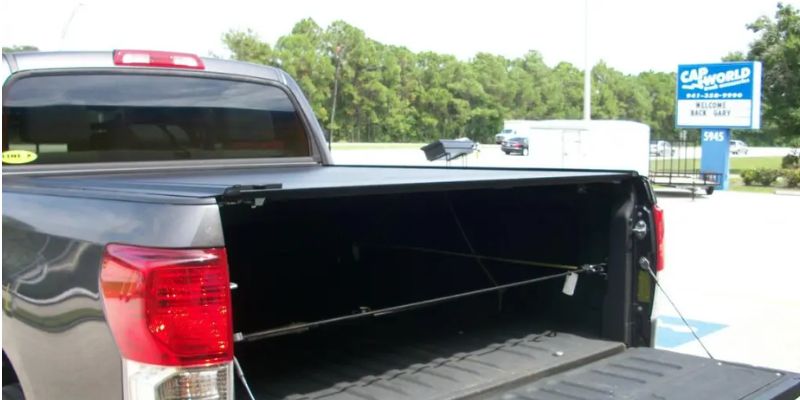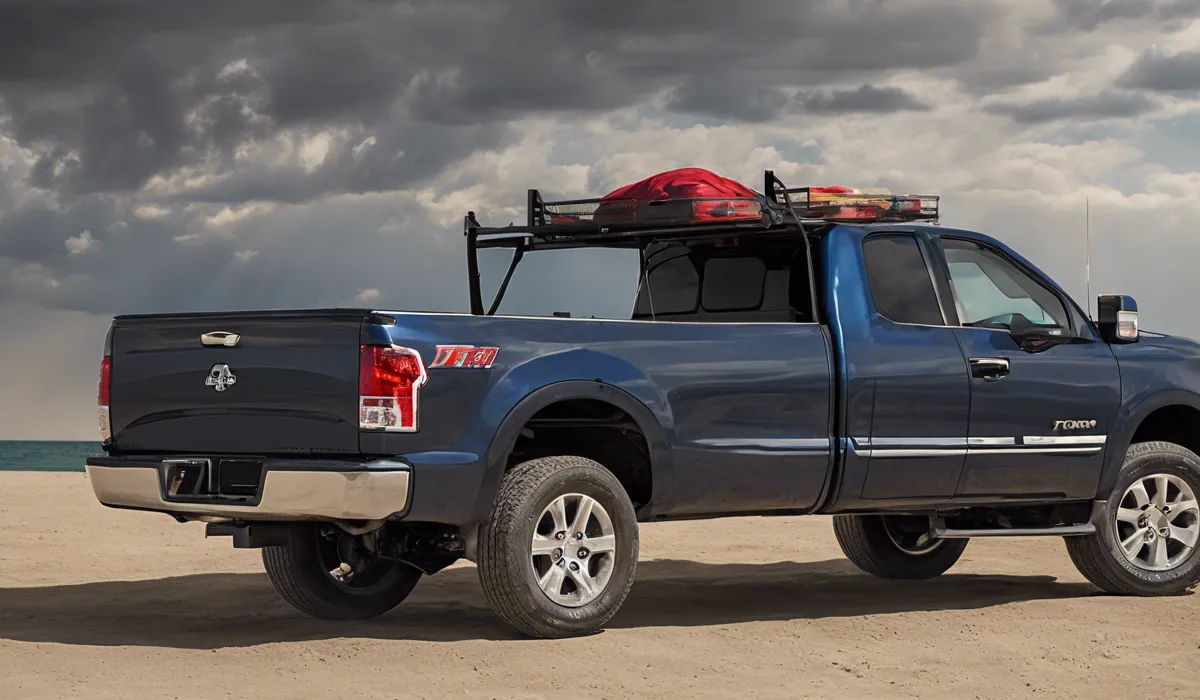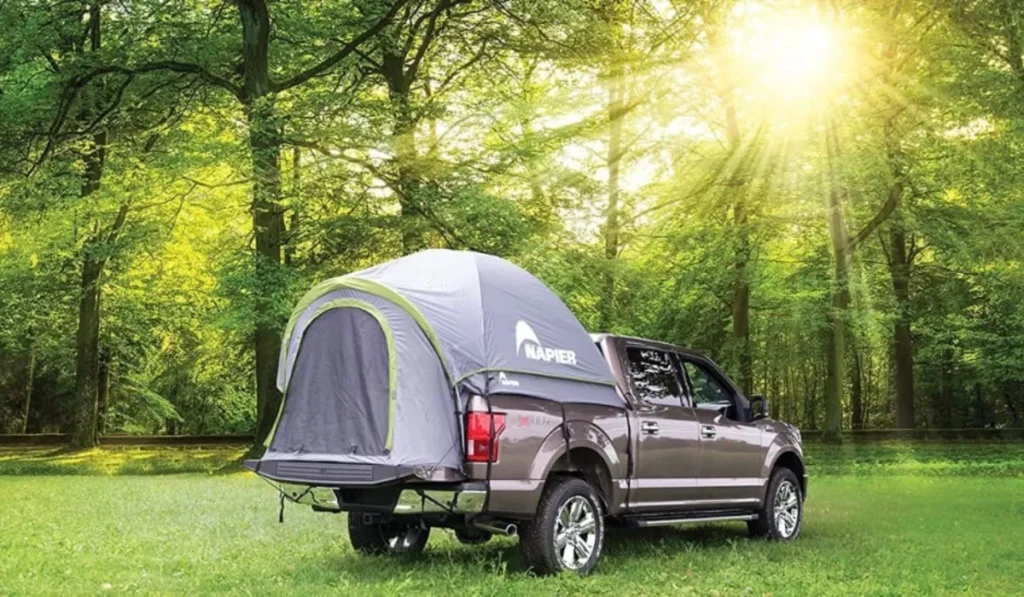It is not advisable to sleep under a tonneau cover. These covers are designed for cargo protection and may not provide adequate ventilation or emergency exits, posing safety risks during sleep.
Understanding Tonneau Covers: Definition and Types

What is a Tonneau Cover?
A tonneau cover is a protective shield that fits over the bed of a pickup truck. Its main function is to safeguard the contents of the truck bed from theft and the elements.
Tonneau covers come in various designs and materials, each with its unique advantages.
Types of Tonneau Covers
The diversity in tonneau covers allows for a range of choices to meet different needs and preferences.
Here’s a look at the common types:
Soft Covers
Soft tonneau covers are typically made of durable, flexible materials like vinyl.
They are lightweight and relatively easy to install and remove.
Hard Covers
Hard tonneau covers are built for added security and are usually made from materials like aluminum or fiberglass.
They can be more expensive and heavier than soft covers.
Retractable Covers
Retractable tonneau covers slide back into a canister at the front of the truck bed. They offer easy access and can be locked in multiple positions.
Folding Covers
Folding tonneau covers consist of panels that fold back towards the cab of the truck, allowing for partial or full bed access.
They can be soft or hard.
Materials Used in Tonneau Covers
Materials range from soft vinyl and canvas to hard plastics, aluminum, and fiberglass.
The choice of material affects durability, security, and weather resistance.
Primary Purposes of Tonneau Covers
Tonneau covers serve several key functions for truck owners:
Protection from Weather Elements
They shield cargo from rain, snow, and sun damage, keeping items dry and secure.
Security for Cargo
Covers deter theft by concealing what’s in the truck bed and often come with locking mechanisms for added protection.
Vehicle Aerodynamics and Fuel Efficiency
Tonneau covers can reduce air drag, potentially improving fuel efficiency for the vehicle.
Safety Considerations for Sleeping Under a Tonneau Cover

Structural Integrity and Weight Capacity
Before considering sleeping under a tonneau cover, one must assess its ability to support weight without collapsing, as it is primarily designed to cover cargo, not to bear weight from above.
Ventilation and Suffocation Risks
Lack of proper ventilation is a significant danger when sleeping under a tonneau cover.
Without enough airflow, there is a risk of suffocation.
Weather and Environmental Concerns
Changing weather conditions can pose risks.
For instance, heavy rain could lead to water ingress, and high temperatures can make the space under the cover dangerously hot.
Legal and Regulatory Issues
In some areas, it may be illegal to sleep in the bed of a truck, with or without a tonneau cover.
Always check local laws before attempting to sleep in a vehicle bed.
Emergency Escape Planning
It is crucial to have a quick and reliable means of exit in case of an emergency.
Many tonneau covers do not allow for an easy escape, which can be dangerous.
Comfort and Practicality of Sleeping Under a Tonneau Cover

Space and Comfort
The confined space under a tonneau cover may not provide the most comfortable sleeping area, and individuals must consider the limited headroom and bed length.
Preparing the Truck Bed for Sleep
To sleep under a tonneau cover, one must prepare the bed with adequate padding, insulation, and bedding to make the experience more comfortable.
Insects and Critters
Even with a tonneau cover, the risk of insects and small animals finding their way into the truck bed exists.
Measures should be taken to minimize this risk.
Privacy Issues
Privacy can be a concern when sleeping in a truck bed, as tonneau covers may not provide visual privacy from passersby.
Alternative Sleeping Arrangements
For those seeking to sleep in their truck, alternatives like tent attachments that connect to the truck bed or truck bed campers with built-in sleeping quarters may offer safer and more comfortable options.
Although sleeping under a tonneau cover might seem like an adventurous and cost-effective option, it is not advisable due to the significant safety risks involved, including insufficient ventilation and emergency exit options.
FAQs About Sleeping Under a Tonneau Cover
Is it safe to sleep under a tonneau cover?
No, it is not safe to sleep under a tonneau cover due to potential ventilation issues and lack of emergency exits.
Can a tonneau cover provide adequate ventilation while sleeping?
No, tonneau covers are designed for cargo protection and may not provide adequate ventilation for safe sleeping.
Are there any tonneau covers designed for sleeping purposes?
No, tonneau covers are not designed for sleeping; they are intended for cargo area protection.
Can you modify a tonneau cover to make it safe for sleeping?
Modifying a tonneau cover for sleeping is not recommended due to safety concerns such as inadequate ventilation and emergency exit access.
What are the risks of sleeping under a tonneau cover?
The risks include suffocation due to poor ventilation, inability to exit quickly in an emergency, and exposure to extreme temperatures.
Final Thoughts
Sleeping under a tonneau cover is strongly discouraged due to significant safety concerns.
These covers are specifically engineered for safeguarding cargo, not for human occupation.
The lack of proper ventilation and emergency exits can lead to dangerous situations, making it an unsuitable choice for a sleeping environment.
